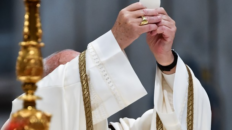We live in a love-hungry world. No wonder he revealed this message.
On December 27, 1673, a nun of the Visitation Monastery in Paray-le-Monial, France, was gifted with an experience of the Divine that left an indelible mark on spirituality. Years later, remembering that vision, she wrote:
“The Lord said to me, ‘My Divine Heart is so passionately in love with humanity that it can no longer contain within itself the flames of its ardent love. It must pour them out through [you], and manifest itself to them with its precious treasures, which contain all the graces which they need to be saved.”
This Divine Love is what devotion to the Sacred Heart of Jesus is all about and it was to this truth that St. Margaret Mary Alacoque committed her life.
Born in Janots, France, 26 years before that first vision, Margaret Alacoque was the daughter of a notary who died when she was only nine years old. (She added the name Mary to her baptismal name at the time of her confirmation.) Sources say that she was mistreated by the family of the uncle who took her in. At this time she was also afflicted with a rheumatic illness, which left her bed-ridden for nearly six years. Once she recovered, it was suggested that she marry, but she ultimately decided to enter religious life. In 1671, she entered the Order of the Visitation, which had been founded by St. Francis de Sales and St. Jane de Chantal only 60 years before.
Although she was known to have been spiritually mature, religious life was difficult for her, and one biography says that “she was slow and clumsy, and perhaps rather absent-minded; she annoyed the infirmarian when working as her assistant and was treated with scorn and ridicule as a result.”
As she received the series of visions of the Sacred Heart of Jesus, she understood that she was being called to spread the message that had been entrusted to her: that Christians should make reparations for their coldness, despite the love that the Lord showed them and that special honor should be given to Jesus through times of prayer each Thursday and on the first Friday of every month.
She was met with strong opposition when she began to carry out the instructions she had received. Although her revelations were condemned as delusions by the first theologians to evaluate them, she eventually found support from her spiritual director, the Jesuit priest St. Claude la Columbiere. Her experience of rejection and scrutiny were further complicated by temptations to despair, vanity, and even self-indulgence
Eventually, Margaret Mary was vindicated and entrusted with more responsibility within her community, including being named assistant to the community’s superior and novice-mistress. The writings of St. Claude and St. John Eudes, the work of the Jesuits, and the introduction of the Feast of the Sacred Heart helped to bring St. Margaret Mary’s mission to completion.
During her second term as assistant superior, she was taken ill. Just before her death on October 17, 1690, at the age of 43, her last words were, “I need nothing but God and to lose myself in the Heart of Jesus.” She died as she was being anointed.
Had it not been for her visions, there is little in the life of St. Margaret Mary that would have set her apart from the other members of her community. And while we may celebrate her for her visions and work of promoting devotion to the Sacred Heart of Jesus—giving new life and dimension to a devotion that had already existed for nearly 600 years—the secret of her holiness can be found in her humble and enduring faith. In fact, it was her extraordinary courage and fidelity that enabled her to stand firm in her conviction that a special mission had been entrusted to her, even when those closest to her refused to believe in her or her visions.
As with the other saints, Margaret Mary was conscious of the gift that she had received—the gift of God’s love and the spirit of adoption. And, like the other saints, she received this gift with a spirit of gratitude that empowered her to pass it along to others, down to our own time.
We live a world in which too many have never heard that they are loved. More than hearing it, though, they need to be shown love. In this love-hungry world, St. Margaret Mary reminds us of the power of faith and love to effect change far beyond what we might believe is possible.
PIN AND SHARE THIS




